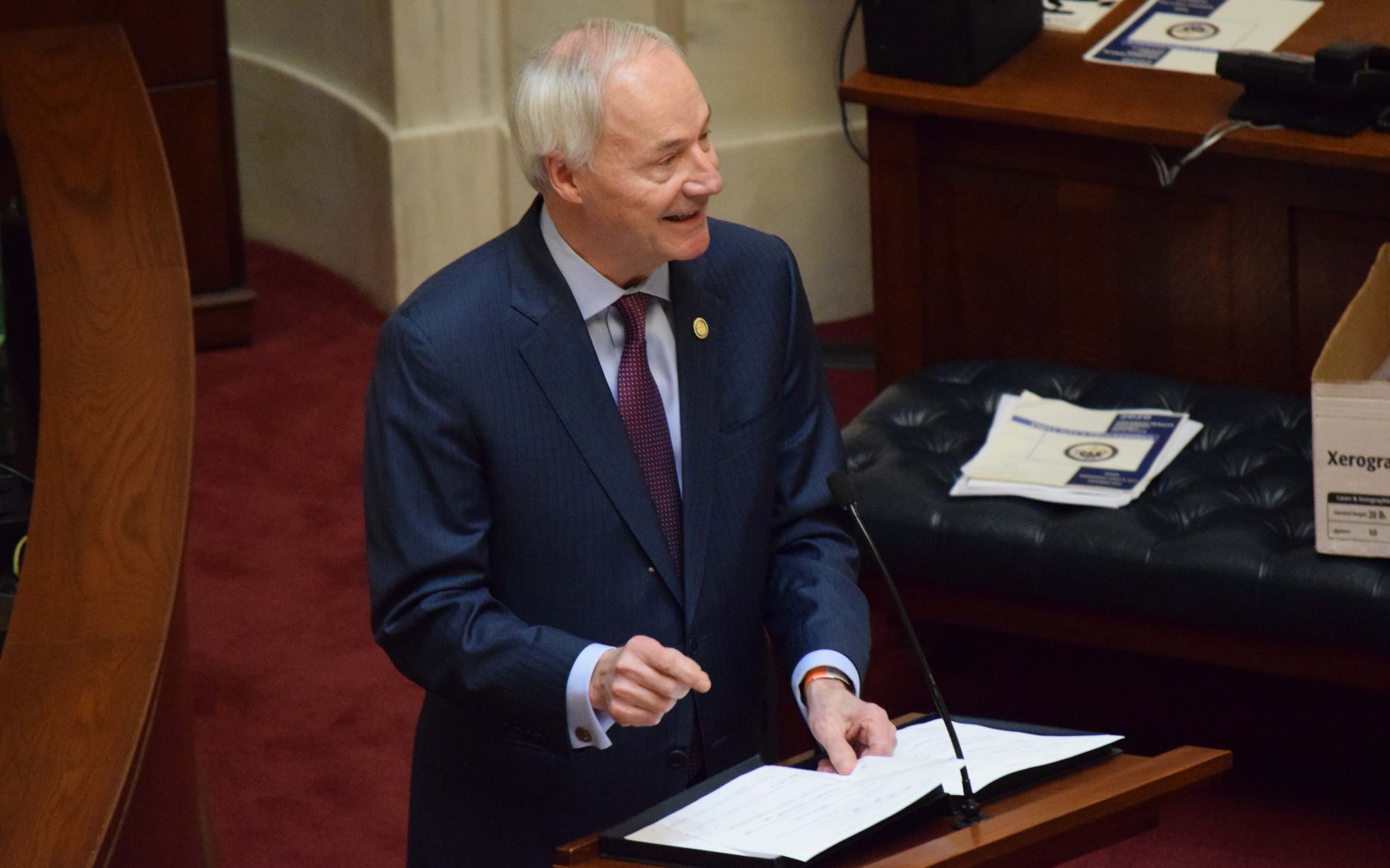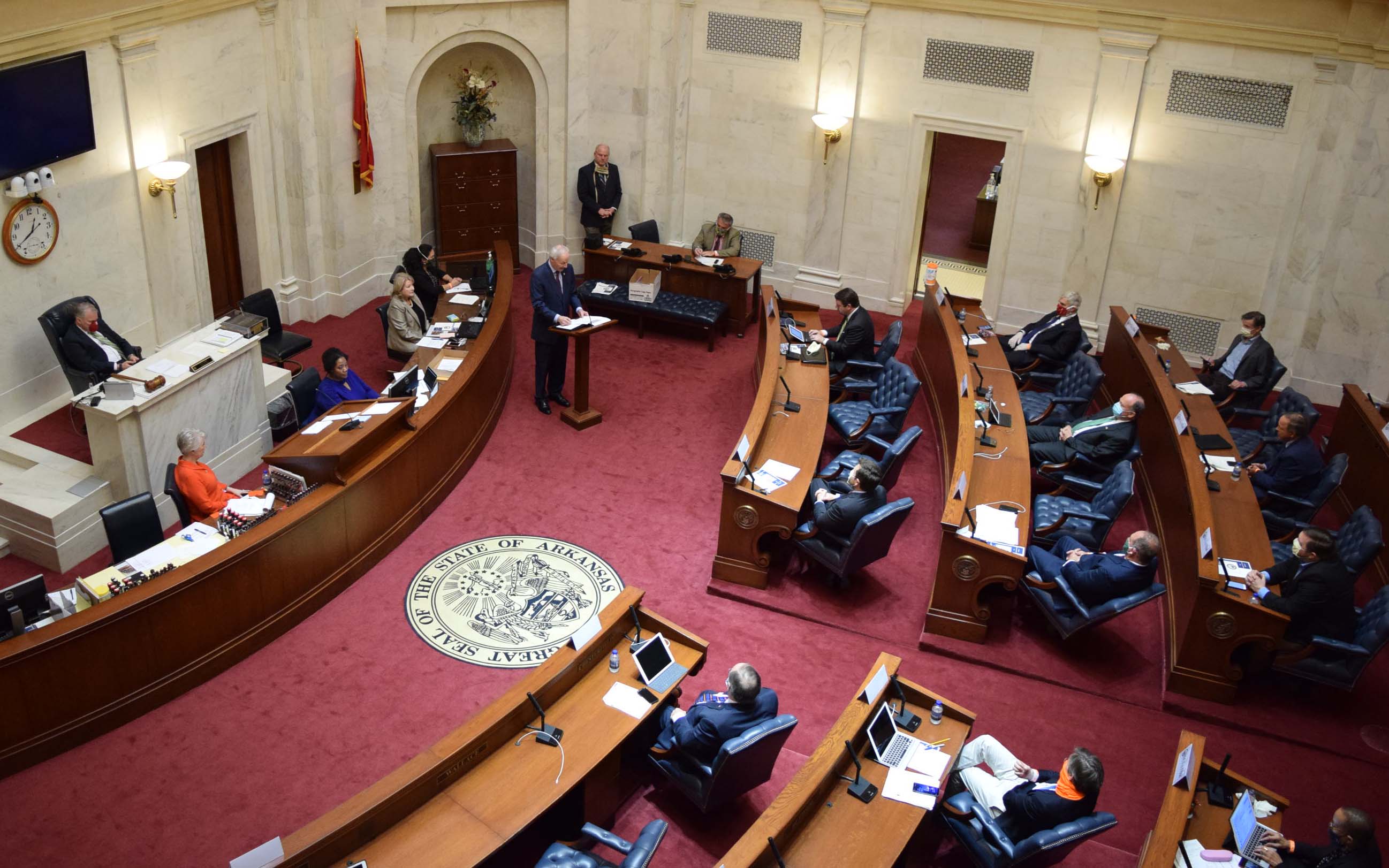Gov. Hutchinson establishes plans to reopen Arkansas economy in phases on May 4
April 27 - May 3, 2020
By Daily Record Staff
With an eye on gradually reopening the state for business in early May, Gov. Asa Hutchinson recently formed two state-led task forces to study and then make recommendations on strategies dealing with public health policy and economy recovery efforts post-COVID-19 pandemic.
On April 13, Hutchinson first issued an executive order announcing the formation of the Governor’s Medical Advisory Committee for Post-Peak COVID-19 Response. The committee, he said, will identify the criteria to guide public health strategy after Arkansas reaches the peak of COVID-19 cases.
“The committee will examine testing capabilities and social distancing protocols and make any recommendations necessary to avoid a resurgence of COVID-19,” said Hutchinson.
Arkansas Health Department Secretary Dr. Nathaniel Smith, who has become a familiar face in carrying out the governor’s policy on mitigating the spread of the highly contagious virus, will chair the committee that includes seven other panel members from the state’s medical and healthcare sector.
During Hutchinson’s daily brief on Tuesday, April 21, both the governor and his Health czar said they believe the number of positive coronavirus cases were nearing peak levels with new incidents topping 300 on two consecutive days. Most of those cases were related to a recent outbreak of positive COVID-19 cases in the state’s Correction system, including 262 infections at the Cummins Prison near Grady, Arkansas.
The official count of positive cases in Arkansas now stands at 2,227 with a total of 43 deaths, according to state Health officials. The state’s first positive case occurred on March 11 in Pine Bluff.
“As I indicated always before, we don’t have sufficient testing in Arkansas – we need to do more,” said Hutchinson. He later added, “I hope we are at our peak and ready to go down, including the prison population.”
Hutchinson also mentioned a conference call he participated in with President Donald Trump and governors from the other 49 states and U.S. territories on April 16. Two days later, the Arkansas governor issued another executive order creating the Economic Recovery Task Force. That panel that includes business leaders and policymakers from the private sector and public agencies that will examine the impact of COVID-19 on industry in Arkansas.
The task force will also make recommendation to the governor on how to shift the state’s economy out of low gear consistent with public health. In the past month, Arkansas has lost more than 133,000 jobs due to social distance and coronavirus-related stay-at-home orders. The governor’s economic recovery task force will be chaired by Northwest Arkansas business leader and Walmart board director Steuart Walton.
“Steuart’s Arkansas roots run deep, and he knows and loves the state,” said Hutchison. “Steuart is engaged in the hospitality, manufacturing, and retail industries. He understands the needs of small business. He is engaged in philanthropy across Arkansas. He is the perfect choice to lead this task force to help restore our economy.”
Following the committee’s first meeting on Tuesday (April 21), the grandson of Walmart founder Sam Walton said the 27-person task force has already set up three committees to look at recovery efforts in the areas of tourism, community and healthcare, commerce, and agriculture and education.
In conjunction with the committee led by Dr. Smith, Walton said the industry-focused task force is working to make its first recommendations to Gov. Hutchinson by May 4, the date the governor has set to begin reopening the Arkansas economy and ease back some coronavirus restrictions. The Northwest Arkansas businessman said the panel will present an interim report on recovery efforts to Hutchinson in early May and final feedback by the end of June.
“In addition to the task force recommendations that we plan to present to the governor from time-to-time, the committee is also going to be focused on a strategic set of recommendations for business and industries across Arkansas,” said Walton. “We hope this helps us thrive in the recovery and well into the future. I am looking forward to the work ahead.”
Under President Trump’s “Opening Up America Again” guidelines, governors across the U.S. are encouraged to begin a three-phased approach based on the advice of public health experts. The guidelines include a downward trajectory of coronavirus illnesses, symptoms, total cases, and positive tests reported within a 14-day window.
“These steps will help state and local officials when reopening their economies, getting people back to work, and continuing to protect American lives,” Trump said during his April 16 virtual conference call with the nation’s governors.
The Trump administration’s model also provides that states’ have a robust testing program in place for at-risk healthcare workers, including emerging antibody testing. State and local officials may also need to tailor the application of these criteria to local circumstances, including so-called COVID-19 “hotspots” that have suffered severe COVID outbreaks.
The White House further encourages governors to work together on a regional basis to satisfy and progress through the phased approach to gradually reboot the nation’s economy, which has seen average weekly layoffs exceeding 6 million in the past month.
Nationally, business and industry leaders are also eager to restart the economy as job losses, gross domestic product growth, and certain areas of the economy are starting to collapse. According to the National Retail Federation, which represents Walmart and many of the nation’s top brick-and-mortar and online vendors, said retail sales saw their biggest monthly drop on record during March as the coronavirus pandemic forced restaurants, bars and many stores to temporarily close across the nation.
“COVID-19 has hit the retail industry unevenly,” NRF Chief Economist Jack Kleinhenz said on April 15. “This is a market of haves and have-nots. The haves are the stores that remain open with lines out the doors to buy daily necessities while the have-nots are the stores that have closed and are taking the brunt of the impact of the pandemic. These numbers should come as no surprise given the mandated shutdown of our economy to slow the spread of the virus.”
Kleinhenz added that March was a month that started out with many stores still open, but far more have since closed. “Don’t be surprised if the data going forward shows a worsening situation,” said the NRF forecaster. “Even if the economy begins to reopen in May, consumer behavior may take a long time to adjust. The road to recovery could be long and slow.”
According to U.S. Census Bureau data, overall retail sales during March fell by 8.7% seasonally adjusted from February and declined 6.2% year-over-year. The monthly drop is the largest ever recorded, exceeding a 4.3 percent decline in November 2008 during the Great Recession.
Outside the retail sector, the National Association of Manufacturers on April 21 released its own “American Renewal Action Plan,” which outlines the trade group’s own three-phase recovery strategy to the Trump administration to help lift the world’s largest economy out its coronavirus-induced recession.
“Our industry has been on the front lines throughout this crisis, providing the equipment and products to keep our country safe, healthy and fed. The nation is counting on us to continue to play a leading role in this effort, and lawmakers must equip us with the tools we need,” said NAM President and CEO Jay Timmons, a member of the White House’s COVID-19 panel to reopen the economy.
(Photos provided)




